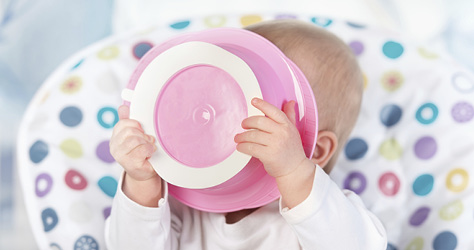Have you started weaning and want to know if your baby is getting enough food?
Then read our quick guide to making sure your baby is getting the right amount.
At a glance
- Weaning is about having fun, learning and experimentation
- Be guided by your baby's appetite, they'll let you know if they are full
- Keep trying a range of foods as it can take a while for babies to decide if they like something

You say...
“I started weaning my 6-month-old a couple of weeks ago, and I’m just not sure how much food to give. How do I know if they’re eating enough?”
We say...
While babies are getting used to the idea of eating, they only need a few mouthfuls. When you start giving them solids, they’re still getting most of their valuable nutrients from milk. So weaning at first is just about having fun, learning and experimentation. Besides, babies may find eating quite tiring as they are learning a new skill , so it's best to let them decide when they've had enough. You can always heat up more food if they would still like more.
As the weeks pass by, you can gradually increase those lovely solids. And when they're used to eating from a spoon, you can give them their food first and their milk feed second.
You can slowly increase their meals from one a day to two, then three. There's no rush at all. And you can also offer some finger foods with each meal.
Are they eating enough?
The best advice is to be guided by your baby’s appetite. As long as they are well and have regular wet and soiled nappies, all is fine. If you’re concerned though, ask your health visitor to monitor your baby’s growth and weight gain to make sure they’re thriving.
Can I give them too much?
Don’t worry about giving your baby too much food. When they’re full they’ll turn their head away and refuse to open their mouth. If they seem hungry you can always give them more food – it might be that they’re having a growth spurt or need extra energy because they’re constantly in the move! The bottom line is most babies are very good at controlling their intake, but again, if you’re concerned, ask your health visitor to monitor your baby’s weight gain.
Keep going with different foods
It can take a while for babies to learn to like something, so keep offering a range of foods – even the ones they’ve rejected outright in the past.
Babies learn to like foods by becoming familiar with the taste, and sometimes, you might have to offer a food several times before your little one learns to like it. If it’s new, just getting them to look at it, feel it and smell it will help. When it becomes more familiar, they really will eat it!
Give a mixture of foods
Your goal is to get them enjoying a balanced meal with the rest of the family by the time they’re 9 to 12 months old, so you can all enjoy the lovely bonding experience of everyone eating together.
It’s important babies get foods from the main food groups and are eating plenty of fruit, vegetables, carbohydrates, protein, dairy and (cooked) egg (unless you are raising your baby on a vegetarian or vegan diet). The charity First Steps Nutrition have a useful downloadable booklet 'Eating Well: Vegan infants and Under 5s'.